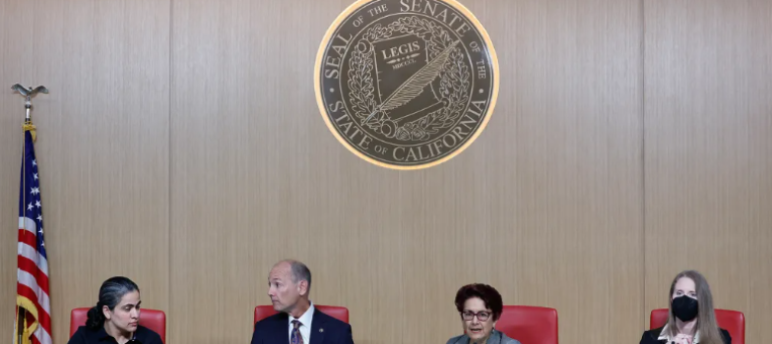California lawmakers on Thursday weeded out hundreds of pricey proposals, including notable ones on crime and technology.
As they culled about one-third of 830 bills, legislative committees killed one that aimed to prohibit broadband providers from charging more or offering slower Internet service in low-income areas, and another to bar law enforcement agencies from relying solely on facial recognition to arrest or search suspects.
The committees also held several Republican crime bills, including one aimed at adding stricter reviews before the state releases sexually violent predators. That prompted the author, Senate GOP leader Brian Jones of San Diego, to state that Assembly Democratic leaders are “now complicit in helping the Newsom Administration protect these predators over families.”
Also held were two crime bills from the newest Senate Republican, Marie Alvarado-Gil of Modesto: one to increase the severity of the crime for making threats at schools or places of worship, and one that makes it a felony to have fentanyl while armed.
But other high-profile bills survived today’s hearings — much to the relief of some advocates who have spent years fighting for their causes.
Chris Lodgson, an organizer with the Coalition for a Just and Equitable California, said he barely slept all night in nervous anticipation. He and a handful of others from the Bay Area and Stockton came attended the Assembly hearing to watch the outcomes of three reparations bills, including Senate Bill 1403 by Inglewood Democratic Sen. Steve Bradford, which establishes the California American Freedmen Affairs Agency.
As each of their bills came up in the fast-paced readout, the organizers gripped hands, sighed in relief — and, after all three bills survived — some burst into tears.
Lodgson said the bills represented an historic moment: “For reparations to be effective, sustainable and successful, we not only need to keep the focus specifically on this uniquely American community of descendants, we need new institutions, new resources and new ideas. Today, we move one step closer to that reality.”
The suspense file hurdle happens twice a year, as the two appropriations committees go through hundreds of bills with a price tag ($50,000 or more from the general fund, $150,000 or more from a special fund), with no discussion and few recorded votes. Besides weeding out costly bills, it’s also a notorious way for legislators to kill politically dicey bills.
Today, each committee decided the fate of bills passed by the other chamber. The Senate committee held 174 of 515 Assembly bills, and the Assembly panel about 100 of 313 Senate bills — a total of 33% held.
That’s similar to the 32% held of the 1,009 bills in the May suspense file hearings. But it’s higher than the 25% average over the last decade, according to lobbyist Chris Micheli.
A major consideration this year: The state’s budget crunch.
Assembly Appropriations Chairperson Buffy Wicks, a Democrat from Oakland, started off the hearing with that reminder: In June, Gov. Gavin Newsom and the Legislature came to a budget agreement that closed a $47 billion shortfall for next year. Wicks said the budget situation “weighed heavy” on the committee.
Other bills that didn’t survive would have:
- Capped late fees for parking tickets and extended the time to pay;
- Created a training program for law enforcement on “transnational repression” to protect Californians from violent acts motivated by international politics;
- Classified the veterinary sedative xylazine, or “tranq,” that has emerged as a street drug mixed with fentanyl, as a controlled substance;
- Required pornography sites to verify that visitors are adults;
- Lifted requirements for doctors to report all suspected cases of domestic abuse to law enforcement;
- Fined insurers for having “ghost networks” of doctors that are inaccurate or outdated;
- Overhauled the state’s wildfire hazard maps, a proposal backed by Newsom but that upset local officials;
- Required community colleges and California State Universities to provide safe parking spots for homeless students who live in their cars.
One of the most closely watched bills — to require Google and Meta to pay publishers for using news content — was sent to the Senate rules committee. That gives bill author Wicks, supporters and the opponents — a powerful coalition of tech companies — more time to negotiate.
The more than 500 bills that did get through today still must win final approval before the Legislature adjourns Aug. 31 to reach Newsom’s desk. The cost of bills he signs into law will be accounted for in the governor’s January budget proposal.
While the governor’s office did not comment on the suspense file, his office pointed to his July 18 veto message on AB 1272 — a bill that would have required the State Water Resources Control Board to adopt guidelines for diversion and water use: “It is important to remain disciplined when considering bills with significant fiscal implications that are not included in the budget.”
Sameea Kamal and Jeanne Kuang are reporters with CalMatters. Briana Mendez-Padilla contributed to this story.


Dysgenics in action.